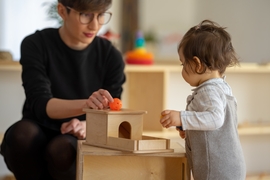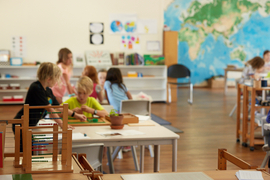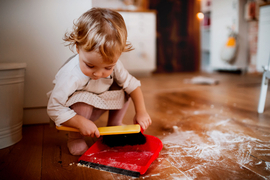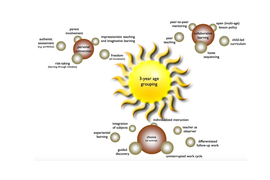
Parenting is one of the most rewarding and challenging roles we play as adults. Our society has high expectations of parents and yet we are not always able to access the resources we need to become the parent we want to be. Montessori can offer you a parenting framework from birth to maturity. It is more than an educational method; it is an approach to supporting the full development of your child.
Here are some simple, yet effective ways in which adults can support the development of a young child.
Movement
From here onwards, its all go! Your baby will reach each movement milestone in their own time. The sequence of gross-motor acquisition starts with rolling > commando crawling > crawling > sitting > pulling to standing > cruising around furniture > finally walking.
You can support your baby’s development of movement by:
- Preparing a safe place for your baby to experiment with his or her body moving
- Giving your baby plenty of time to practice new movements, on different surfaces and from different perspectives once sitting up.
- Allowing your baby to practice new movements at their own pace. Encouraging your baby to sit or stand before they are able to achieve these positions spontaneously could push them before their bodies are strong enough.
- Thinking about your baby's clothing in terms of their ability to move freely, some garments can get in the way.
Language
Your baby is very interested in listening to the sounds of and emotion in your voice. They will look at your mouth when you speak. Listening to you and others around them talk is how they will learn their mother tongue. This is due to the absorbent properties of your baby's developing mind. The more your baby is surrounded by language, the more they will learn.
- Talk to your baby about the things you are doing during change times; name objects in your baby's environment when they show an interest; sing to and with your baby.
- Even very young babies enjoy books, you can present colourful picturebooks with one or two words on each page.
- Offer small cloth or board books which your baby can hold independently.
- Keeping background noise down will make it easier for your baby to tune into the language you are providing.
Social and Emotional Development
- Babies and young children need secure and loving relationships, which enable them to moderate their stress levels. These signficant relationships can include the mother and father, other family members and also caregivers such as childcare workers. When your baby feels loved, this supports their healthy brain development.
- Babies and young children receive their information about how to behave in social situations by watching the adults in their lives. You are their role model.
Suggested Activities
- Once your baby is crawling, offer her balls and other toys to roll around and chase
- Offer your baby the lots of opportunities to crawl including different surfaces with different textures and inclines/declines
- Make sure that couches and tables are strong enough to pull up on when they are ready to do this.
- Avoid television or screen-based activities. Research shows that “screen-time” may be detrimental to infants under 2 years of age.



